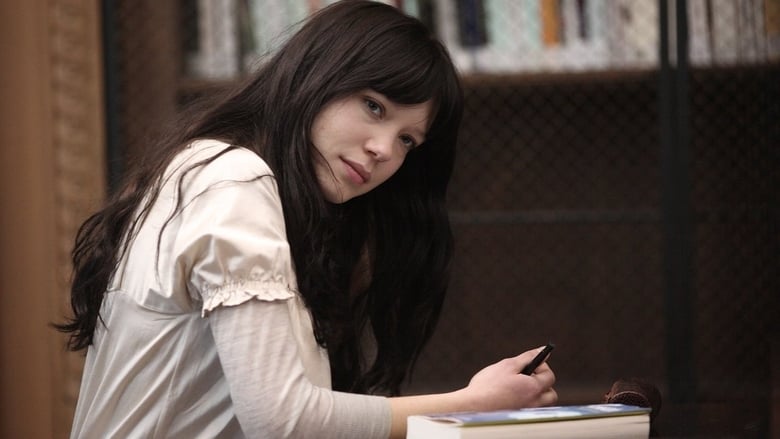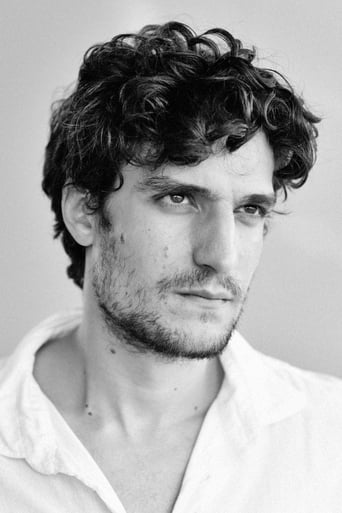The Beautiful Person (2008)
In the wake of her mother's tragic death, French teenager Junie transfers to a different high school. Though Junie lives mostly inside her own head, her beauty and stoicism win her the attention of the entire male student population. Junie begins dating the gentle Otto Cleves, but finds herself intensely drawn to her youthful Italian language teacher, Nemours. When Nemours begins to reciprocate, serious complications ensue.
Watch Trailer
Free Trial Channels
Cast


Reviews
Wonderful character development!
It is a performances centric movie
It's fun, it's light, [but] it has a hard time when its tries to get heavy.
All that we are seeing on the screen is happening with real people, real action sequences in the background, forcing the eye to watch as if we were there.
I honestly thought I was watching a film from the 60s until I looked it up on IMDb. Everything rung of the 60s from the washed-out color palette (lots of white, grey and cold bluish tints) to the inexplicably brooding, emotionally muted female protagonist who falls into a love tangle (as in Buñuel's "Belle du Jour" (1967) or Vadim's "Le repos du guerrier" (1962)) to the very 60s French soundtrack (Nick Drake, Alain Barrière, Callas) to the big hairstyles on men. And of course there are heavy themes of love & sexuality, common to those classic French films that defined the genre "60s French film". Imagine my surprise when I learned that this film was made in 2008 from a novel (La Princesse de Clèves) set in 1558 in the court of King Henry II of France.I have to admit, I didn't like this film at first. Coming from a relatively puritanical culture, it didn't sit well with me that the film was about a 30-something high school teacher trying to seduce a 16-year old student. But if you can get past that, and if you can get past the premise that each character has 2 to 3 paramours in a tangled web that would make Shakespeare resort to his slide rule, then you'll be OK. This is very much a tale of loose sexual morals, but that is precisely the intent. The question posed is: can 1 true love exist, free of all the scandalous infidelities & betrayals, or is human nature such that impetuous desires and unchecked emotions always cause sexual & emotional chaos?You may find yourself needing to watch this film a 2nd time or, as I had to do, rewinding certain scenes to figure out exactly who is who, especially if you're watching the English subtitles. That is because the love triangles (and love rectangles and love pentagons) come at you pretty fast with no big explanations for the slow folks in the audience. But even if it doesn't sink in at first, you'll probably have a decent grasp by the end of the film if you pay close attention. While I found this to be frustrating at first, I felt ultimately satisfied that the director took this approach, not holding our hand to lead us through every plot point. Instead, like the web of love & deceit itself, the plot is intended to be challenging if not confusing.In the 2nd half, the story distills down to the main 3 characters, and the final 30 mins pack a whollop. My only real criticism is that it seemed to drag on 10 minutes beyond the dramatic climax & revelation, thereby watering down the effect of that powerful scene. Other than that, I found this to be a masterful telling of a tale that begins slowly, convoluted & seemingly uneventful, but then it snowballs to a rich and satisfying closure.
This film desperately tries to be deep but ends up being utterly superficial. Beautiful actors, Nick Drake soundtrack and excellent cinematography can't hide the fact that this is a confused and amateurish story without a message. The main problem is the script: we never get to know the characters, we don't understand what motivates them. There is no real "story" to follow, no beginning and no end. Time after time the filmmakers seem to forget the main characters/story line and far to much time is spent on subplots and side characters that don't interest us, since they haven't been introduced earlier in the film. The actors are OK but the script just doesn't give them anything substantial to work with.
The latest Cristophe Honoré's film is a logical continuation of "Les chansons d'amour". The last phrase in the latter was "Love me less, but love me longer". And how long exactly can one love? "La Belle personne" is Honore's answer to this question. According to the director, unfortunately, love doesn't last forever, at the end it's a very disappointing feeling and the only honest conclusion for it can be the one that happened to Otto. It's a highly sentimental film done in a crude style. The film's composition is very smart, with the storyline that appears messy for most of its duration, but all the loose ends come together by the end, when Junie makes her brave and unexpected decision (a great surprise of the film). All the sideline events seemingly distracting from the main story lead Junie to this particular decision, more in the 17th that in the 21st century style, but justified by all she has seen and by her own uniqueness as a "completely honest person" and a "very strong person" (according to others).The choice of actors is excellent, as always the case with Honoré. I would like to mention Léa Seydoux who has an amazing presence, which was crucial for the story to make sense. Although far from being a standard beauty, she possesses the ability to convey mystery and look beautiful while being sad. Luis Garrel is another actor with a great magnetism who makes the story credible.In general the film is done with an impeccable cinematographic taste and it's impossible not to mention the song by Alex Beaupain, which just like in Dans Paris, is the only song in the film, but sung right on screen in the emotional climax of the film, and just like in Dans Paris, it occurs like the most natural thing.La belle personne, like the director's previous films, requires a very attentive viewing or maybe more than one viewing in order to notice the details, and the details are crucial for the adequate interpretation. In some instances, it is also important to know some French (the crucial conflict of the lost/found letter story gets resolved once Nemour points out to Junie that from a grammatical point of view it's written by a man, and not by a woman – the moment unfortunately completely omitted from the English subtitles). Otherwise the viewer might feel lost in curious images without appreciation for the creator's concept.
After teaching us the art of levity with his splendid "Les Chansons d' Amour", Cristophe Honore tackles a loose adaptation of the Princess Des Cleves in a modern day Parisian high-school. Junie, a new comer in mid-term, joins her cousin's class, and soon afterwards gets entangled in the game of love. Otto, a boy that I would term the common denominator of serious lovemaking and affection in the film, of stably pursuing his affection towards Junie, is in a way our guarantor in the film of common sense and, at least for me, someone to identify with. His friends term him simpleton when he admits his embarrassment on how to get closer to Junie. But that happens admirably quickly and unaffectedly from both parts, even though we get to understand that Junie has recently lost her mother, that is why she came to school at this time of the year and why she gives way to moods of grave beauty.We are then introduced to the third main character, the one who is given ample presentation in a way, Nemours, a somewhat winning womanizer of both his fellow teachers and students, teacher of Italian.In one of his classes, and under the spell of Callas' Lucia di Lammermoor, Junie gets, for reasons no one probes, overwhelmed with emotion - this is the decisive moment, when Nemours and Junie pierce each other with glances signifying love.Next step, a miscast letter, that everyone thinks is Nemours' and that is being addressed to Junie, finally gets into Junie's hands - yet it is, as we come to learn, her cousin's, addressed to a boy, whence the pressure to retrieve it, though with admirable clarity and absurdity Junie surmises that it is a letter really written to her by Nemours, even though he plainly denies it. Clarity and absurdity go here together because, even though it was not addressed to her, it was she that was actually the addressee, it was meant for her.And as everything that is written means tragedy, it soon arrives. Junie, even if having claimed the letter, does not give in to Nemours' lovemaking, but instead gives herself to Otto, after having tenderly and mischievously given him just before a children's book with the title Otto, and half-said to him that there is another person involved. That is really finely crafted by C.Honore in a visual geometry of passion. Eventually, Otto learns that something is going on between Junie and Nemours and calmly tries to confront it with Junie, yet, there is misunderstanding involved: the person who witnessed them, witnessed wrongly that the two kissed, from the perspective he saw them. That is why Junie rebuts Otto's claim; that way, and as it should be, we loose the common denominator in love's proceedings, and love becomes fatal. Otto does not believe her, and in doing so, does not love her any more. He takes it for a blatant lie and soon afterwards after literally singing away his despair, he commits suicide. From that point on, Junie decides not to give herself to Nemours on grounds that their love will last for some time then expire, ranging it to the hordes of commonality, thing impossible, since Otto, by his suicide, raised the standard to such a degree, namely and actually loving her all his life, that anything less will be degrading. So, after this explanation, she leaves it all behind.Up until somewhere in the middle of the movie I was still wondering to what kind of explosion C.Honore's boiling sourdine will give in, but I felt in a way that the film regressed to some kind of mannerism, in using devices of the two films that came before it, namely the singing in exactly the same tone, and using an actor/singer of the "Chansons d' Amour", right before Otto's suicide, and then, the cut editing in a somber interior reminiscing the technique involved in "Dans Paris", when Junie and Nemours finally meet, the two of them, alone, inside. It may seem trifle, yet I took it as regressive, since C.Honore set himself the standard so high!That said given the fact that this was made for TV, it is of superlative quality as any film we come to expect from French film-makers. Also the fact of watching the same team of actors playing in two films in a row, gives one a rare warm feeling and the wish that they would go on for some more!Even the fleeting presence of Chiara Mastroianni! The subplot is a pleasure, too: the way the two young boys' love is presented in a mocking documentary fashion; and the way in their case the third party reacts, recurring to violence, not contending himself, as happens in the other triangle, to the violence of words.The photography is very good: a gripping, nuanced grayness allover finely portraying the incidents, and at one point, the beautiful faces of the adolescents, not exactly like the rococo fresco coming in the middle of the sequence, but the way a grave, beautiful Giotto stares us. The denouement may not be as sublime as the "beautiful faces" are, but maybe this is the point.








